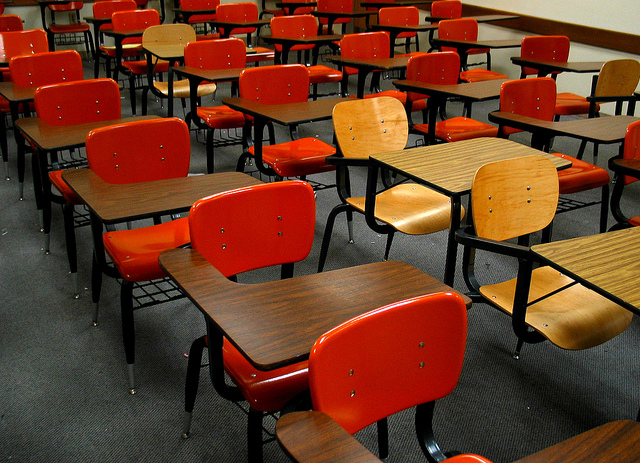Public schools in B.C. are not opening today, as normal. The efforts of the B.C. government to negate two court decisions won by the BC Teachers’ Federation (BCTF) was the breaking point in negotiations over the weekend.
Negotiations have been going on for well over a year, with little progress. Teachers started rotating strikes in May and a full strike for the last two weeks of June. The government responded with a weird and insulting “partial lockout” before the full walkout.
Teachers were prohibited from being at the school more than 45 minutes before and after school and at lunch break. They had to eat their lunches outside the school. They were also directed not to do any preparation or marking outside of school time — all so salaries could be cut by ten per cent, with the agreement of the Labour Board.
Now, with no agreement over the summer, the strike and lockout continue into September.
The key issues for teachers are class size and class composition. Class composition refers to the number of students with special needs related to class size. In the late 1990s, the BCTF negotiated limits to the number of students with special needs, with smaller classes or more supports if the number was over the designated number. The contract also included ratios of specialist supports. The BCTF agreed to no salary increase in order to gain these conditions.
After the B.C. Liberals were elected, Christy Clark as education minister in 2002 brought in legislation that eliminated class size and class composition limits. They wanted to reduce funding by imposing worse teaching conditions on teachers to save $275 million a year. This cut the teaching force by about 3,000 — 10 per cent of teachers.
Twice over the next dozen years the B.C. Supreme Court said that canceling contract provisions by legislation was a violation of the Charter rights of teachers. After the first decision, the government arrogantly passed the same legislation again. A second B.C. Supreme Court decision again ruled that the government had violated the rights of teachers. This time it ordered the original contract provisions reinstated, and provided that the government would have to pay $2 million to the union in damages because it had not carried out the provisions of the first judgment.
Instead of accepting the court decision, the government appealed, with hearings to be held by the Court of Appeal this coming October. At the same time, government set an objective of getting the BCTF to negotiate away the rights that the courts said had been violated.
In an effort to let school start as normal, the BCTF pushed the government to agree that Vince Ready could mediate the dispute. Leading up to the long weekend, the BCTF substantially reduced its proposals, but on Saturday Ready announced that the parties were too far apart for him to continue at this time.
The government frames the situation as the BCTF seeking more than the amount that the government unilaterally declared was the maximum — about half of the anticipated cost of living for the next five years. They say the other public sector unions already agreed to this pattern that it had imposed.
The BCTF points out that teachers in B.C. are among the lowest paid in the country and that B.C. spends $1,000 per student less than the Canadian average K-12 expenditures.
Above all, though, the BCTF will not agree to negotiate away the court decisions that say the rights of teachers have been violated and that the government must make good on a remedy for the dozen years since that started. The remedy sought by the BCTF is not more salary, but a return to the teaching conditions for which teachers already gave up salary.
Money isn’t really the issue for the government either. It has created a program to pay parents $40 a day for each child 12 or under to cover daycare expenses for every day missed by the strike. For an elementary class of 30, that is the equivalent of $1,200 a day, well over what it is prepared to spend on teachers in their classrooms. It also agreed with CUPE that its members who work in schools would receive full pay, even if they could not work because of picket lines.
Despite government efforts to demonize the union, polls indicate that the public support for teachers is greater than that for government, particularly among parents.
This first week of no school will see demonstrations around the province, as well as picket lines around schools. The BC Federation of Labour is working with the BCTF to make these more than just teachers. A rally on Tuesday is being held at the office of education minister Fassbender followed by a Wednesday rally at the office of Christy Clark. On Friday, study sessions will be held in union locals around the province to discuss future directions.
Larry Kuehn is the B.C. Teachers’ Federation’s Director of Research and Technology.
Photo: flickr/Christopher Sessums



